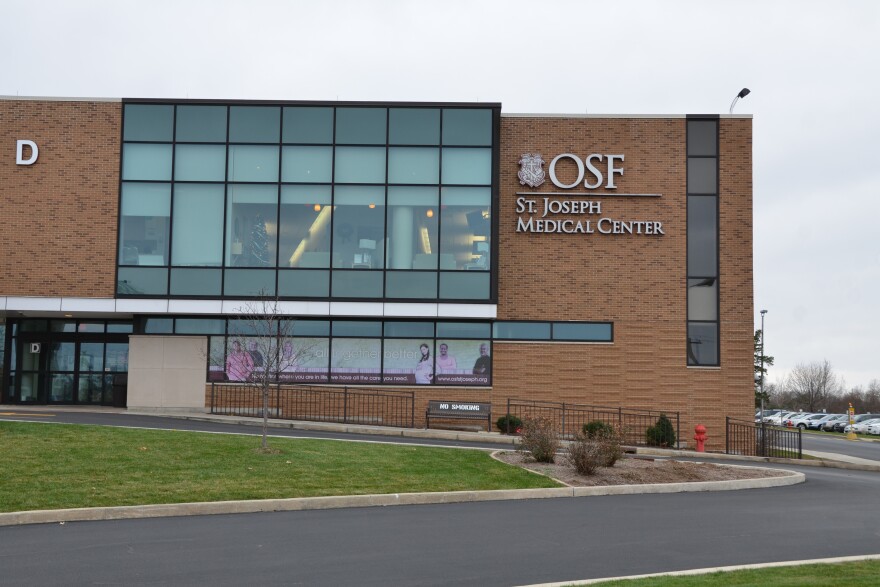The health care systems that run Bloomington-Normal’s two hospitals say the federal rescue package will only cover a small part of the revenue lost from the coronavirus.
Hospitals are facing a counterintuitive two-pronged threat. Elective surgeries have been postponed or canceled; patient visits to clinics and urgent care centers have plunged. At the same time, many hospitals are spending more on supplies and overtime to treat COVID-19 patients.
“Nobody’s having their knee scoped right now,” said Tony LoSasso, an economist with expertise in health at DePaul University in Chicago. “Of course, those are very, very lucrative procedures for all involved. Nobody’s going in the hospital and doing those things now.”
The Bloomington-Normal economy’s fate is closely linked to the financial health of OSF HealthCare and Advocate Aurora Health. OSF and Advocate are two of Bloomington-Normal’s Top 10 largest employers. There are more than 9,200 people working in health care and social-assistance jobs, their paychecks putting them squarely in the middle class.
Overall business is down about 40% at OSF St. Joseph Medical Center in Bloomington, President Lynn Fulton said Wednesday. Only emergency surgeries are being done to help preserve personal protective equipment (PPE), blood supply, and capacity for COVID-19 response, she said.
“Because of that, we have a number of our employees — all of a sudden, the body of work they were doing is just gone,” said Fulton.

OSF is projecting a financial hit of $330 million through the end of its fiscal year. Some employees will be furloughed or told to take paid time off. It’s unclear how many Bloomington-Normal employees are affected by those measures. Some have voluntarily moved into Pandemic Health Worker (PHW) roles, supporting OSF’s new home-monitoring program for patients with COVID-19 symptoms.
“It’s a nice way to keep some of our (employees) working during this time, and it makes them feel good because they’re able to serve those most in need,” Fulton said.
Advocate Aurora Health operates Advocate BroMenn in Normal, which is in the process of being sold to Carle. Advocate say it’s implemented “special pay practices in addition to enhanced (paid time off) policies, family care subsidies and lodging programs" for employees.
“All team members will continue to receive compensation and benefits through April 30, and we are reassigning team members to help in other areas based on need. We will evaluate our pay practices month to month,” Advocate said in a statement.
CARES Act Assistance
The $2 trillion federal rescue package, called the CARES Act, includes $100 billion for hospitals and health care providers. The American Hospital Association (AHA) says that money is starting to flow, but the first $30 billion released “simply was not of the magnitude necessary.”
Advocate said: “While we have received $70 million in stimulus to-date with an understanding that we will receive more, as with other health care providers across the nation, it will fall dramatically short of covering the loss of revenue we have experienced due to cancelling elective procedures across the system through at least May 1, coupled with the increase in our expenses in an effort to prepare for potential surges in COVID-19 patients."
Peoria-based OSF is still determining how much it will get from the CARES Act “to offset the significant operating losses we are incurring now and expect to continue to incur,” said chief financial officer Mike Allen.
The first batch of funds was disbursed based on Medicare revenue a health care facility or provider generated in 2019, Allen said. Because of that, the AHA says hospitals received significantly less than their overall proportion of Medicare spending or overall spending, resulting in payment that's a small fraction of what is needed. U.S. Sens. Dick Durbin and Tammy Duckworth, both Illinois Democrats, on Thursday asked the Trump administration to change how its doling out money to providers.
“We are thankful for the assistance, but we expect it will only cover a small portion of the projected operating losses for OSF HealthCare,” Allen said.
The coronavirus and its aftermath could have impacts on the health care business that last long beyond any stay-at-home order.
Providers are likely going to be more diligent about stockpiling equipment, including PPE, said LoSasso, the DePaul economist. And the abrupt adoption of telehealth could prove to be permanent, LoSasso said. One historic barrier to telehealth has been that providers were not reimbursed well, or at all, for the services.
LoSasso said he expects to see more telehealth reimbursement models pop up, probably starting from the federal government on down, with private insurers following suit.
“That could change us as patients. That could change some of our thinking,” he said. “There will be some real opportunities to reorganize care and really bulk up on that side of things.”
We’re living in unprecedented times when information changes by the minute. WGLT will continue to be here for you, keeping you up-to-date with the live, local and trusted news you need. Help ensure WGLT can continue with its in-depth and comprehensive COVID-19 coverage as the situation evolves by making a contribution.


